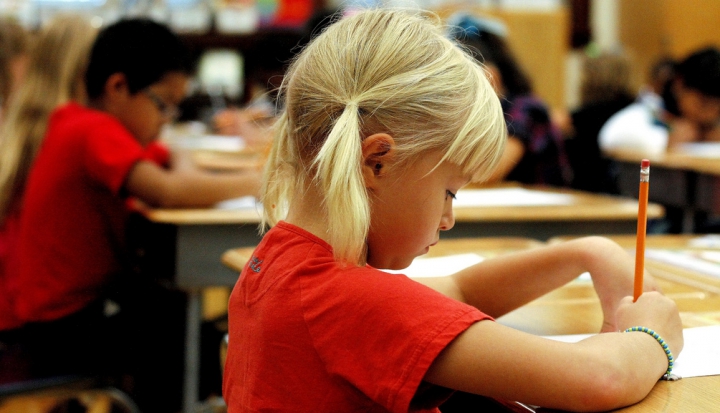As the school year winds down and children start looking ahead to summer vacation, the heated debate about the national Common Core standards shows no signs of letting up. But while the debate in public (and some private) schools revolves mostly around the question of whether or not the standards are the right way to go when it comes to giving students the best possible education, Catholic school parents are debating a different issue.
While the standards are designed for public schools, approximately 100 Catholic dioceses have adopted them in some form. The National Catholic Education Association has established the Common Core Catholic Identity Initiative (CCCII) to help Catholic schools implement the standards in a way that is compatible with their Catholic identity. But some parents aren’t convinced that state standards belong in Catholic schools at all.
Parents in the Archdiocese of Milwaukee have banded together and sent a letter to Archbishop Jerome Listecki and superintendent Kathleen Cepelka protesting the use of Common Core standards in all Catholic schools. The Milwaukee Journal Sentinel reports that the letter came with a petition of 1,000 signatures of concerned parents. “We’re at a loss for why secular standards have been put in our schools,” says one parent. Another claims that Catholic schools’ top priority should be “to get children into heaven, not Harvard.”
Those comments represent just a portion of the national protest against Common Core from Catholic parents and educators. Some observers have even called the Common Core a government attempt to take over Catholic education. Bishops in Madison, Wisconsin and Pittsburgh, among other dioceses, have publicly rejected the standards. In Pittsburgh, the bishop’s decision was no doubt influenced by a group of protesting Catholic parents, who list among their objections that the standards “will result in the social indoctrination of our children, interfering with religious liberty.” One of the Pittsburgh parents’ concerns was in relation to a fourth grade book on the Common Core’s recommended reading list called “The Kid’s Guide to Social Action,” which contains this apparently objectionable line: “Parents can only give good advice or put (their children) on the right paths, but the final forming of a person’s character lies in their own hands.”
But Common Core has its defenders in Catholic circles, too. Some simply think that keeping track of the benchmarks for public schools is a good rule of thumb for Catholic schools, especially considering that many students will likely transfer into public schools at some point in their educational journey. And using a portion of the standards doesn’t mean schools will have to remove any of their faith-based curriculum. Milwaukee’s Archbishop Listecki echoed these sentiments in a December letter to parents, adding that, “Our Catholic schools already regularly exceed the Common Core standards. Using them as an additional measurement will do nothing to change the curriculum, reading material, or content–especially Catholic content–of our Catholic schools.”
Kevin Baxter, superintendent of elementary schools in the Los Angeles archdiocese, made similar comments about the role of state standards in Catholic education. “We’ve always used a secular standard as our academic benchmark,” he told U.S. News & World Report. “Then our job as Catholic educators is to make sure the faith is infused and the Catholic identity of our schools is strong. That’s always been something that we’ve had to do.”
The jury is most definitely still out on whether or not Common Core will be a success in helping schools give kids the best education possible in preparing them for adulthood. Debates over what might work best in education are healthy and will always be part of a good school system, and like any new initiative, Common Core should be held to the highest scrutiny. But at the same time, Catholic schools shouldn’t discount the standards just because of their secular origins. A better approach might be to accept the standards and then aim to exceed them within the context of a faith-based environment. Or, as Baxter says, just keep doing what Catholic schools have always done–and what has always made them exceptional.
Flickr image cc by Phil Roeder













